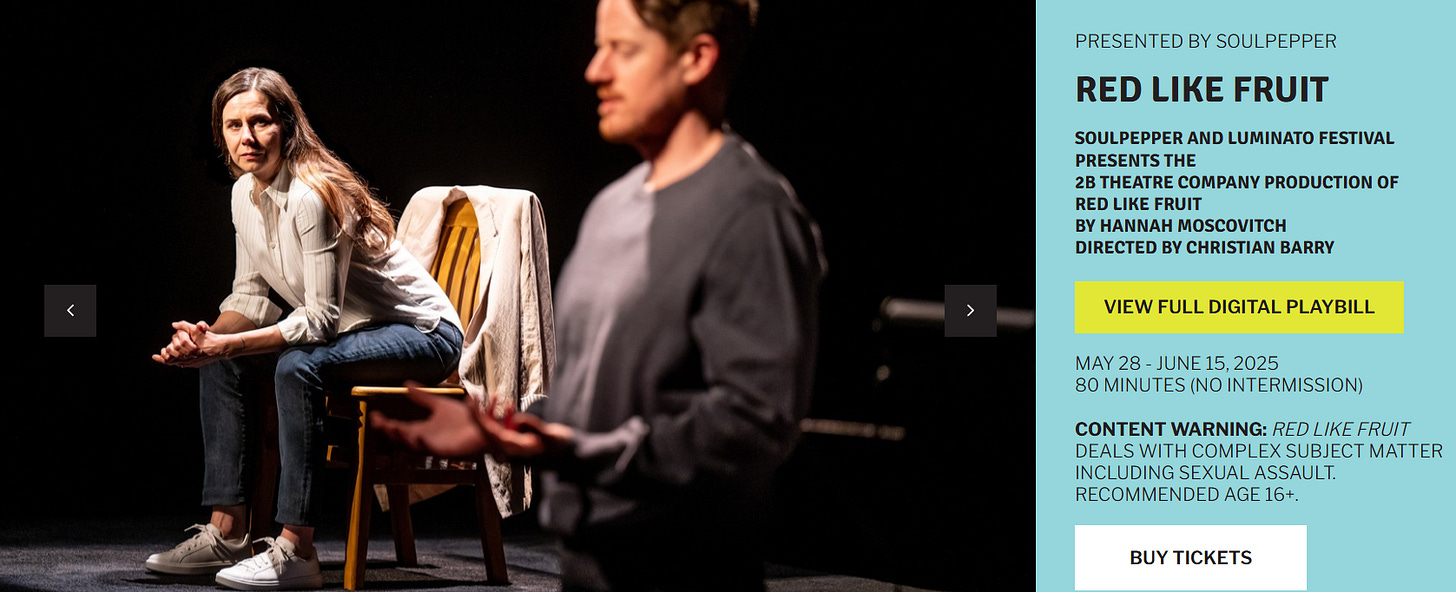All of our crises of June
The June Notebook, mostly a sedate affair, comes with an endnote of some outstanding reactionary lunacy
Could it really be June? Half of 2025 already gone?
A few things that have been on my mind:
Tina Fey’s Four Seasons on Netflix
Red Like Fruit at Soulpepper, Hannah Moscovitch’s much lauded play about MeToo, reads very 2017
I’ve been loving Andrew Coyne’s The Crisis of Canadian Democracy, a book on the many ways our political and electoral systems are not fit for purpose anymore, until I hit the chapter on the judiciary
The Pitt, a spin-off of ER, is ER with a woke makeover
We check in with the Toronto History Museums to see which oppressed minority’s turn it is this month to be celebrated (there are two, it’s going to be busy)
The Globe’s editorial ghost comes out in favour of the unboxing of Sir John A… but only if there’s some sort of a memorial about residential schools erected close by
The New Yorker profile of one of the Trump admin’s more outré gurus is, give or take a couple of anti-Substack digs, a must-read.
Four Seasons
Yes, fine, this Tina Fey & 30 Rock co-writers remake of the Alan Alda and Carol Burnett movie will be Gen X catnip but I would also bet on its intergenerational appeal. With Fey, smart, textured writing is pretty much a guarantee. We meet the friend group in Spring, the three middle-aged couples who have been holidaying together for years (do people do this? it doesn’t matter, it’s a fun conceit) and ecounter first signs of trouble as Nick (Steve Carell) announces he’s about to leave his wife of twenty-five years because he feels dead inside, she has given up on life but he doesn’t want to, and “we are like co-workers at a nuclear facility, spending each night staring at our separate screens”. His wife Anne (Kerri Kenney-Silver) is, however, while he is getting the best bagels from the far away bakery, secretly preparing the renewal of the vows ceremony. In Summer, Steve Carell is with a much younger woman, and they are all at an eco resort of her choice (tents! compost! sustainable transit options!) that none of them enjoys much. In Fall, the crowd gathers in a college town where the kids of the family go to school and mount plays about their ‘family trauma’. Winter takes place on NYE, the two couples and Anne celebrating separately from Nick who is with his belle and her teetotalling, non-skiing 30-something friends. Then: tragedy strikes.
This play is just not interested
Are we lacking information about the awfulness of sexual assault? Hannah Moscovitch in Red Like Fruit would like to tell us about it. It can really really hurt women, we are told, and mark them for life. The set-up is vaguely interesting - a monologue written by a woman (Michelle Monteith), the central character, is delivered by a man (David Patrick Flemming) - and we eventually learn it’s because he’s likelier to be listened to by an audience of strangers, his voice carrying more authority. In his voice but her words and her wordless reactions to the spoken, we learn about Lauren’s life (she’s a gainfully employed journalist writing about domestic violence; is married and has children) and about her day (she’s meeting a male colleague for lunch who keeps talking at her and telling her how ‘the MeToo movement went too far’... no, seriously, he is there to represent the callous man but what of the women like me who also think that some of the chips of the MeToo fell too far and destroyed some innocent lives).
Does sexual assault mark a woman for life? It’s been a conversation among women for many decades and very intensely so in the last dozen years, but the play is not interested: yes, you are a victim for life, is its answer. Moscovitch appears not have read Larissa Phillips’ extraordinary piece, let alone people like Camille Paglia or Virginie Despentes who attempted to de-dramatize the effects of sexual assault for victims’ sake. Was the sexual assault in the play equivocal, therefore dramatically interesting? Not really: Moscovitch here opts for the obviously awful (a grab by a tourist guide in a foreign country; a non-consensual intercourse forced on a stunned-into-silence teen by a beloved older cousin (!) in his house). I didn’t really buy that the character would have waited until she found herself reporting about domestic violence professionally to process her memories of the grim sexual experience with the cousin as assault. There is no way she would not have been in therapy for a decade by then.
We hear nothing new. None of our certainties are tested. Bad human acts are… bad.
A crisis indeed
I was raving to everybody about Andrew Coyne’s first book - it should be given to all new citizens, it explains the basics of the Westminster system and FPTP with a lot of historical examples and local colour! - until I hit the judiciary section. The alleged recent supremacy of the judiciary over Parliament is a right-wing obsession, he writes before proceeding to argue that it was the parliament itself that voted the Charter and all the alleged steps through which it gave away its powers to settle contentious political matters to the Supreme Court. Activist judges? A Conservative bogeyman, and no mention of a glaring recent example of the assisted dying bill and its ongoing judiciary-led expansion. Provinces need to use the notwithstanding clause less (reasonable point); it is usually used to curtail rights of some poor, persecuted minority, Coyne goes on, listing alongside the Quebec ban on religious symbols in public sector “a Saskatchewan law forcing schools to tell parents when their children change their pronouns” (a somewhat myopic take on an important and contentious issue).
The Senate section wasn’t my favourite either, because the author is disposed against any unelected body being given any substantial influence over law-making. So yes, the Canadian Senate is particularly dreary as it is populated by patronage and bound to be dominated by Liberal appointees till the end of time, but any kind of power over legislation from an unelected chamber of sober second thought would not be Kosher, is the general tenor. However, there have been many cases in recent years, in Westminster as well as Ottawa, of the second chamber being the only place featuring the voices breaking the consensus of the Commons on various bits of madness. Senator Linda Frum expressing reservations against the gender identity bill, C-16, was a rare voice of reason. Over the pond, the British HoL contains many independent voices not bound by party whipping or fear of being de-selected in the next election, which manifested significantly again on the issue of self-ID, sex segregated data collection, pediatric gender medicine. It’s odd that Coyne doesn’t notice that an unelected chamber is occasionally, when we’re lucky, free from precisely the kind of conformity and cowardice that he criticizes in MPs and parties in the other chapters. As he notes early on, the electoral process and party affiliation seem to filter in the worst kind of blank slate careerist who’s in it for advancement through obedience.
The book rises back with the final chapters on elections: the dreary selection procedures for the candidates and party leaders, the obligation to sell memberships in nominations and leadership contests, the way the elections are run, debated and reported (the media get a shovelful of flak, deservedly). In its good parts, The Crisis is the kind of politics handbook that every voting household should have.
Producers of ER did not come out of the last decade unscathed
The Pitt, a Noah Wyle-led medical procedural created by the people who made the old NBC ER, is well worth sampling for a few episodes, but then you start noticing stuff. Criminal behaviour is only coming from the white people; in the rough and tumble of overcrowded waiting rooms and understaffed exam rooms and ORs, ethnic minorities tend to behave impeccably. It’s the Angry White Man who’s the loudest of the crowd waiting to be admitted and demands special treatment; he also, a few episodes in after several outbreaks with staff and racist remarks to a male nurse (who does this to somebody that can get you past triage??) punches in the face the saintly charge nurse on a cigarette break. Every further instance of crime and suspected crime is committed by white people: the stolen ambulance which results in a city-wide chase; whoever gave drugs laced with fentanyl to the group of college kids prepping for exams; two women involved in trafficking; a high school student whose mother fears he is preparing a mass shooting. Black patients seem to be there to teach us a lesson. A screaming woman, for example, is brought in by the paramedics and treated with disrespect and tied to the gurney because neither of them appears to be aware that you can be in a lot of pain if you have sickle cell disease. A mixed-raced female doctor sets them straight.
Elsewhere, a transwoman is ‘misgendered’ at the triage booth (ie correctly sexed and called by the name in the documents, not the new one) while waiting to be seen about a cut, a minor medical issue that of course has nothing to do with clearly identifying patient’s biological sex. (A lot of health issues do! But in order to be taught not to misgender, a minor medical problem will have to be used. Anything more serious will have to involve ‘misgendering’.)
And so on. The last four episodes of S1 apparently go frantic as the hospital suspends normal operation and becomes a war camp receiving 112 gunshot victims from a music festival mass shooting… but I lost interest. Just like in the old ER, there is so much intubation and defibrillation and so many weird cases that need to be puzzled out that the whole thing just defies belief. And, as much of today’s television, it never ends. When you don’t have any constraints towards concluding, you can introduce any old nonsense at any juncture just to keep escalating. Main reason I’ve given up on Severance and Slow Horses after a handful of episodes.
Let’s check what Toronto History Museums have been up to lately
It’s both the National Indigenous Peoples’ Month and the 2SLGBTQIA+ Pride month, so behave accordingly.
Sir John A, unboxed at last
Uh-huh, says the Globe in its editorial voice. Unbox if you must, but make sure you add something about residential schools right next to the statue.
The Globe’s trajectory from the stodgiest establishmentarian outlet in the country to the home of some of the most inane ‘progressive’ columnizing should be studied in journalism schools.
It’s the Right’s turn
While in Canada and a lot of other high income countries the new clerisy carries on almost intact, the greatest challenge to the liberal democratic project in the US now decisively comes from the Right. Have a look at this longform profile of Curtis Yarvin, the Trump Administration’s shadow guru. This is some wild, video game-informed political theorizing that makes Julius Evola look like a Bay Area lefty.







